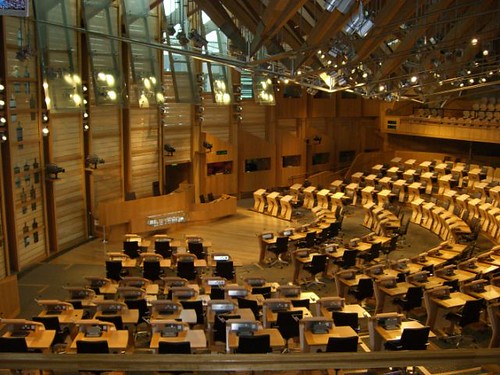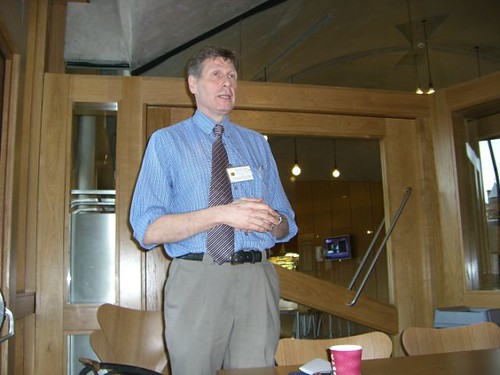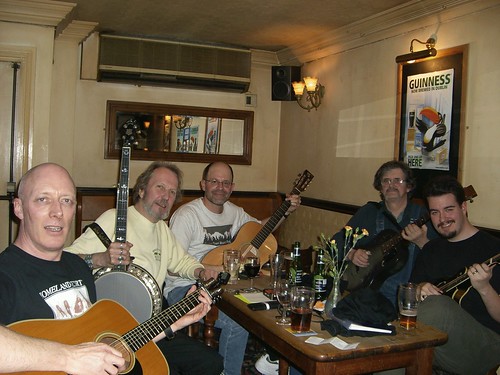Another great update from Professor Share heading the ILACA program in the UK.
Most people associate Edinburgh, Scotland, with castles and kilts. During our recent visit there we saw both,of course, but a focus of our trip there was Scottish nationalism. When Tony Blair took power in 1997 he carried out his pledge to devolve some political power to Scotland, Wales, and Northern Ireland, all of which got their own parliament. Scotland’s last parliament had been abolished with the Act of Union in 1707. Therefore, the inauguration of a new Scottish parliament in 1999 was shrouded in symbolism. The parliament building, a modernistic architectural marvel designed by the late Catalan architect Enric Miralles, was itself controversial, both for its design and its cost (which escalated to ten times the allocated budget). In contrast to Westminister, The Scots purposely designed their chamber to be semi-circular so as to promote consensus and as a way of rejecting the UK’s adversarial style of politics.
To date, the new Scottish executive has been dominated by a Labour-Liberal Democratic coalition. Labour has been the dominant party in Scotland for decades, so Blair’s decision to push devolution can be viewed as an attempt to reward the most pro-Labour part of the UK. However, in recent years Blair’s Labour government in London has been increasingly unpopular. The Scottish Nationalist Party (SNP), which advocates independence for Scotland, has surged in the polls, despite the fact that top members of the government in London (including Gordon Brown, set to replace Blair as prime minister) are Scottish. Blair’s unpopular foreign policy may have unwittingly created an impetus for Scotland’s secession.
My British politics students were fortunate to have a meeting with Kenny MacAskill, a leading SNP member of the Scottish parliament. MacAskill carefully and persuasively made the case for Scottish independence. The SNP, he argues, believes that Scotland is fundamentally distinct from England and the rest of the UK, viewing it more like the Scandinavian social democracies (to which Scotland has geographic and cultural similarities). An independent Scotland, he claims, would seek a stronger welfare state, would adopt the Euro, and would work more closely with the United Nations. He argued that the war in Iraq has particularly irritated Scots, suggesting that an independent Scotland would never have gone to war. He believes an independent Scotland is economically viable, due to North Sea oil, tourism, and high-tech industries. He constantly cited Ireland as a prosperous but once-poor nation-state that Scotland could emulate.
Strategically, MacAskill argued that the Scottish electoral system (a mixed electoral system that has a large element of proportional representation) would unlikely deliver the SNP a majority in the next elections (scheduled for May). However, he thinks the SNP can form a coalition government with some other parties (perhaps the Liberal Democrats, and possibly even the Conservatives) and demonstrate to the electorate that it is capable of good government. At some future point, the SNP would propose a referendum on independence which he believes could be successful.
Of course, there are many unanswered questions. The UK is a unitary state, and Scotland cannot legally become independent on the basis of the referendum: it would need permission from London. There are serious economic questions (e.g. who controls the oil in the North Sea), and equally vexing political ones.
MacAskill and the SNP have advocated a non-confrontational form of nationalism. He pointed out that the SNP have made a serious effort to avoid basing the claims for nationalism on any past conflict between Scotland and England. MacAskill believes that most of the problems confronting Scotland at present should not be blamed on London, and he believes that an independent Scotland can still work closely with the rest of the UK.
Whether or not Scotland becomes independent, the creation of the Scottish parliament has done much to rekindle a sense of pride and confidence in Scotland. The parliament has already passed a number of laws that further differentiate Scotland from the rest of the UK. We were the beneficiaries of one such policy: smoking is banned in all public indoor spaces in Scotland, and were therefore able to breathe easier during our visits to local pubs.
Professor Share forgot to mention that he has managed to find other folks to jam with in London; seems that bluegrass has infected that part of the world, like a bug-resistant sickness.
Tags:



